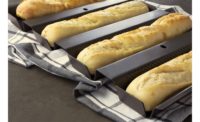How does proper lubrication impact the performance of machines in snack food and wholesale bakery facilities? And how does that relate back to their use of sensors for processing-related issues like quality assurance and control, food safety, efficiency and productivity, and product verification? We spoke about the intersection of these issues with Cory Fuller, application engineer at Interflon, a Dutch company with stateside headquarters in Swanton, Vermont.
Ed Finkel: Tell us what Interflon does and what products and services you provide to food manufacturers?
Cory Fuller: We’re a specialty lubrication company. A great deal of our products are food safe. As far as sensors go, we partner with companies that make automated lubrication systems. This last weekend, I was at a poultry processing plant in North Carolina, and we installed a system where the sensor would detect when a wheel goes by on a track. We had to time everything to the millisecond to spray oil into bearings of wheels as they pass by. We do constant sprays, mist sprays, and pulses.
EF: What other types related of technology do you offer?
CF: We have another system called Rotolube that rotates with your chains and applies lubricant directly to the bushings. That keeps the machines running a lot better. They clean the sensors, so they won’t short anything out. Mostly our sensors are pointed toward keeping machines running and keeping productivity up. We’ve partnered with several companies to do single-point lubricators and application systems. Depending on how complex they are, those sensors can get really crazy.
EF: What are some examples of how your products help bakeries and snack makers?
CF: We increase the lifespan of chains and bearings and bushings. We reduce the average draw on motors and increase the lubrication intervals. I’m working with a bakery right now. They went from having to lubricate their bearings once a week, to about once every three months. In the automated systems, the sensors pick that up. Part of my job is to help rewrite their preventive maintenance program.
EF: How else do you see bakeries and snack makers using sensors?
CF: Outside of our purview, there are loads of sensors that are used for a bunch of different purposes. Temperature and humidity sensors are used a lot in ovens, in drying lines and in roping lines, just to make sure temperatures are correct, and you’re not overly humid. You have a problem if your chocolate doesn’t dry correctly, for example. Lasers can be used for scanning bar codes, for shipping and processing and things like that. There are ultrasound and vibration sensors to help track bearing wear, and to a certain extent chain stretch, which goes back to keeping the machines running. If those are broken, you’re not producing anything.



